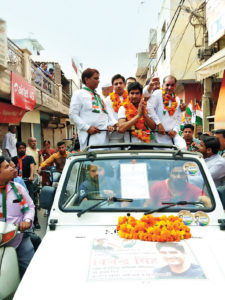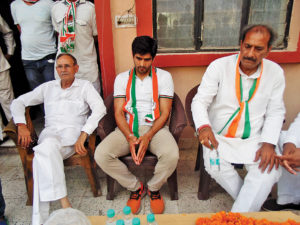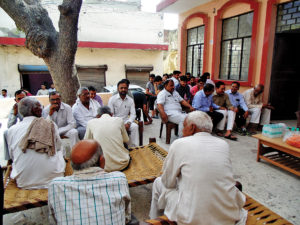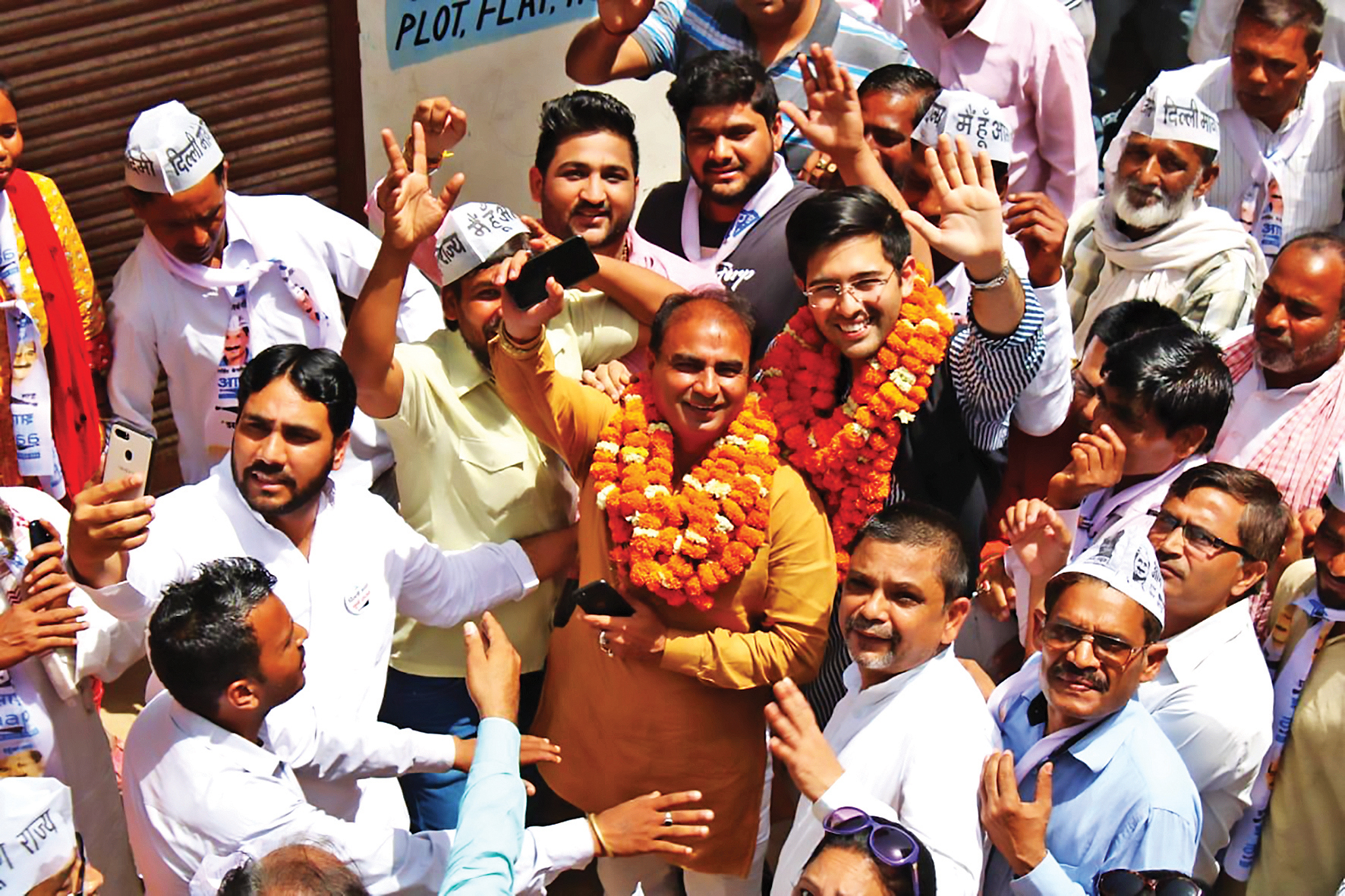Two of the three candidates in South Delhi’s triangular contest are unlikely politicians — young men in their thirties, one a boxer and the other a chartered accountant. Patriot accompanies them on the campaign trail
- “You call yourself a youth leader, but so is your opponent, what sets you apart?”
Contender 1: “I am what I am; I am not fake.”
- “What do you think of your challenger?”
Contender 2: “He spends 11 and a half months time outside the country and 15 days in the country. This time for those 15 days he decided to fight in the upcoming elections.”
These are the responses of 33-year-old Vijender Singh (Congress) and 30-year-old Raghav Chadha (Aam Aadmi Party), both vying for the title of Member of Parliament from South Delhi constituency. The incumbent MP is BJP’s Ramesh Bidhuri.
We focus on the two new entrants to electoral politics and the core of their campaigns —where the boxer seeks to tug at heart-strings by talking of his struggle to rise to the top, and the chartered accountant sticks to his party’s report card and promises.
Gloves off
Type in the words Jonapur, Fatehpur Beri and the image that comes with the search results is of young boys and men in wrestling gear flexing their arms.
Already, it seems like a place which will welcome Vijender Singh, the international boxer, with open arms. As we reach a little before the Congress candidate arrives for his election rally, we take a measure of the area. Older men, younger men, burly men, skinny men — the key word here is men.
Asking around about why no women were showing up to support Singh, we got the answer that the gathering was called at the Badi Chaupal, where the panchayat meets — a space still considered largely as one for men. A place where apparently important decisions are taken.
One bystander also says that the timings of the meet didn’t quite match, as women are more likely to be working at around four in the evening. Which doesn’t seem convincing.
Singh shows up soon enough. And rejecting the kurta that most politicians like to be seen wearing, he arrives in a t-shirt and jeans — more in keeping with the image of an athlete.
He smiles, touches elders’ feet, accepts garlands and listens, looking sombre as others speak before him into the mic.
Former MLA from Chhattarpur Balram Tanwar, earlier rumoured to be in line as South Delhi candidate, tells the gathering why Singh would be a good prospect — because he takes interest in health. Furthermore, he adds that Singh knows how to sit on a charpoy — and is, in fact, from their family, a reminder of his Jat background.

He criticises Kejriwal’s combative style of politics. “He (Kejriwal) has already fought for four years and now he is preparing for another five years.”
While the others speak, Singh plays with his scarf, then with a bottle cap, keeping his eyes lowered, not making any eye contact with the audience.
In the next meeting at Aya Nagar, he is much the same. Either he was tired, or it was a show of respect and meekness — that he was just a young man trying to win everybody’s favour. Here the crowd soared as the roadside meeting brought traffic to a standstill, as passersby tried to find out what was happening and then to get a glimpse of the celebrity.
After these sessions, people surrounded him, matching steps with him, to get photos taken. Men, women, children and even some parents push their children forward. Every time, Singh obliged with a smile.
Mouthing support
Vijender Singh’s speeches are never more than a minute long. He does not speak about the Opposition, nor about what work he will do. He instead keeps the conversation on himself: on how he did not have money growing up to buy clothes or shoes… of how he struggled.
“I am from Haryana; my father is a driver. I have toiled just as you have to come this far from what my life was. I won medals”, is just about what he says in every speech.
There is no rhetorical flourish, but the Congress candidate still connects with the large number of Jat voters in the South Delhi constituency. Out of the total 42 villages here, 18 are dominated by them and 12 by the Gujjars.

In Ghitorni, Singh speaks a little more, adding that he has not come to participate in politics, but to do work. And even remarks, “I’ll probably make a lot of mistakes…” trailing off to add, “If you vote for me, great, if not then it’s okay, I won’t mind”.
He also reflects on the charge that his candidature is unjustified as he is an outsider, to which he countered that he was living in Vasant Kunj for the past eight years. While he plays it safe in his speeches, Congress counsellor from Aya Nagar, Ved Pal takes it upon himself to play politics.
He asks people around to show if the BJP had spent even a thousand rupees on the area. He also accuses them of not just a lacklustre job but also for “using force against people”.
Pal also takes a jab at AAP’s candidate, accusing Chadha of wiping his hands clean after shaking voters’ hands. This does have the desired effect, as Congress supporters in Ghitorni repeat the same line when asked why they won’t vote for AAP. They also, surprisingly call Chadha “too educated”, and say that they want a leader more like themselves — meaning Singh.
What may have further turned the mood against AAP is Pal’s systematic accusation, like Tanwar’s, that the party only believes in fighting, and doing no work.
What’s interesting is that they appear to accept Singh’s lack of experience, on the understanding that all the leaders sitting around, including himself, would work with Singh for the betterment of the area.
In this constituency, the sentiment seems to be pro-Congress, but after Singh and his entourage leave, a few confess that they will vote for the BJP.
However, the boxer is confident he will win this bout. When asked why it would be different for the Congress this time, after losing seven seats in 2014, he points to himself as the key for change. He also says he understands that there are issues of water and sanitation in the constituency, about which he would learn by listening to the people.
A few voters who promise their support are banking on the prospect of the Congress getting another chance of running the country.
Common man vibe
With the Lok Sabha elections falling in the overwhelming heat of India’s summers, the evening of Chadha’s campaign is like any other. Even as the sun refuses to retreat, two cars swoop in on Ambedkar Nagar with AAP flags and posters and the other with a screen playing Chief Minister Arvind Kejriwal’s message of all the work his party had successfully completed, and what his party intends on doing next.
A few gather around as a makeshift stage is erected in the middle of the market. Among them was a woman seeking a job for her differently abled son.
Another woman Sita, virtually in tears, shows the water bill which had come after a year, claiming she owed Rs 1 lakh to the Jal Board. She had her heart set on showing the bill to Chadha. And though doors had been closed on her before, she says, she still has faith in AAP because of its work in lowering electricity and water bills, improved sanitation and the transformation of state-run schools.
There are many whose vote will go to AAP even if they have a bone to pick with the party. Any promise that could not be fulfilled is blamed on the Centre-led BJP.

While Chadha, a chartered accountant, may be the national spokesperson for the AAP and a recognisable face of the party, many first think of Kejriwal when the party comes to mind. But this seems to work in Chadha’s favour.
He greets people with folded hands, a quick greeting to the left, one to the right; sighting older voters, he extends his hands to touch their feet. By nightfall, he takes to the stage on which other speakers are seated on the ground, not on chairs, perhaps in keeping with the party’s image of being for the common man.
One by one, AAP leaders rise and speak about their work, and the BJP’s lack thereof. Like his rival Vijender Singh, Chadha too keeps his eyes lowered, on his phone.
AAP counsellor Prem Chauhan urges the people to vote for someone educated, someone intelligent and to remove the “chowkidar”. He assures them that just as he met the residents of the area, Chadha would be a full-time leader.
He promises them CCTV cameras and jogs their memory about the work his party had already completed.
Chadha himself, unlike Singh, decries the alleged lack of work by the present MP, calling his reign ‘Gunda Raj’. “Did he come even once after the elections? Did he (Bidhuri) make roads, sewage lines, mohalla clinics, hospitals?”
He also pointedly speaks about how his party is not like the BJP which divides people. Instead, he wants people to focus on what could be done by the party if Delhi had full statehood. Like making it safer for “our daughters and sisters”, which the BJP wasn’t allowing, by stalling the installation of CCTV cameras in the past three years. “When we will get statehood, we will make security so good that women will go out even at 11 pm and no one can touch them.”
He tells the gathering that people would come to buy their votes, to which their attitude should be: Take the liquor, the saree, the sewing machine, and even ask for the gulabi note (Rs 2,000) instead of the Rs 500 they may be given. After that, “Vote for the jhaadu.”
In the end, Sita, the woman with the enormous water bill, is not successful in speaking to him. He, however, successfully conveys the message of AAP’s quest for statehood.
For now, though, what matters is winning the seat. The two young men competing against each other could not be more different, and the voters know it. For Chadha, the people’s positive outlook towards AAP’s work on ground may help, and for Singh to be successful, is something fully dependent on his background and his career.
On the fence
In JJ cluster Gautam Puri, voters seem to be divided between AAP and Congress. Residents are vocal about their disillusionment with the area MLA – AAP’s Narayan Dutt. Some complain of not receiving clean drinking water, others of poor sanitation. And while they blame the BJP MP Ramesh Bidhuri of never looking at their plight since winning the seat in 2014, the division was on whether AAP could really fulfill its promises or bringing Congress back was the better option.





